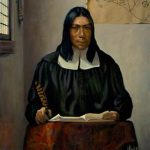In 1650, the General Court of Massachusetts chartered Harvard College because “many well devoted persons have been, and daily are moved, and stirred up, to give and bestow, sundry gifts, legacies, lands, and revenues…that may conduce to the education of the English and Indian youth of this country, in knowledge and godliness…” [Emphasis added] By 1656, Harvard… Read More »
Previously in this series, I wrote brief biographic sketches of two men: Anselm of Canterbury and Peter Abelard. Today, I want to contrast their views of the world and theology, particularly the topic of the atonement. Basically, the atonement is a theological shorthand for “how did Jesus’ death save people?” It is a complex issue that has… Read More »
Last week, we began this series with a biographical sketch of Anselm of Canterbury. Today, we continue the series with a sketch of the life of Peter of Abelard. Peter of Abelard, the Peasant Philosopher Unlike Anselm, Peter Abelard was not born into a noble family. His family were Bretons, living in the town of… Read More »
We tend to think that the Romans viewed the Celts as barbarians. In reality, the Celts were very integrated into the Roman system. Celto-Iberians had fought in the armies of Hannibal during the 2nd Punic War, and they were very well known in later Roman armies. (There is a nod to this in referring to… Read More »
Cristobal Colon, known to English speaking people as Christopher Columbus, discovered a route to the Americas in 1492. He was a Genoese (no one would have dared call him “Italian” to his face) sailor with a lot of experience in the Mediterranean and the North Sea. It is very possible that he had sailed with… Read More »



